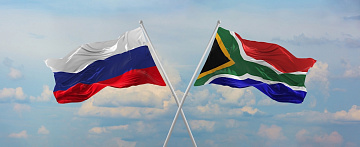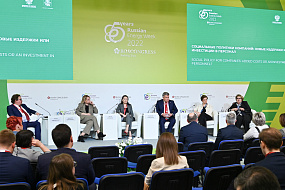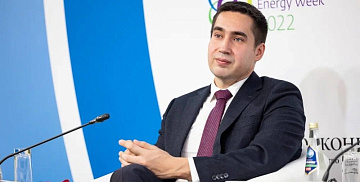Technological Sovereignty and Low-Carbon Energy: Looking to Tomorrow

In recent years, almost all
countries around the world have returned to developing nuclear energy despite
all the talk about the “green agenda”. Participants in the Russian Energy Week
session ‘Technological Sovereignty and Low-Carbon Energy: Looking to Tomorrow’
discussed what mechanisms will be used to ensure interaction between countries
in this regard and how to satisfy the increased demand for energy without
harming the environment.
KEY CONCLUSIONS
Nuclear energy has
become popular and safe worldwide
“The ‘post-Fukushima syndrome’
[the fear of peaceful nuclear development that arose after the accident at
Japan’s Fukushima Daiichi Nuclear Power Plant in March 2011] has been
completely overcome. It has been overcome both psychologically and legally. I
mean that the regulators [...] have included all the elements in the necessary
requirements that allow us to continue to consider nuclear energy safe,
comfortable, and much-needed,” Rosatom State Atomic Energy Corporation Director
General Alexey Likhachev said.
“The Republic of Belarus is
pursuing the global trends of transitioning to a green economy and low-carbon
development. This is enshrined in the most important programme documents. For
the energy industry, the priority objective is to meet the needs of the real
sector of the economy and the population for energy resources, while maximizing
its efficient use and reducing the burden on the environment,” Belarusian
Minister of Energy Viktor Karankevich said.
“We need to modernize all
energy systems and transform our energy markets. We need nuclear energy. We
need clean energy sources […] Nuclear energy fits perfectly into our system,
and I think this also concerns other regions of the world, because we need to
integrate nuclear energy if we are serious about decarbonizing the economy,”
Turkish Minister of Energy and Natural Resources Alparslan Bayraktar said.
“Nuclear energy is crucial to
supplying the population with energy, and by 2031, we will have tripled the use
of nuclear energy […] Russia plays a special role in nuclear cooperation,”
Ambassador Extraordinary and Plenipotentiary of the Republic of India to the
Russian Federation Pavan Kapoor said.
“The attitude towards nuclear
energy has changed dramatically around the world. It has been affected by
climate issues and the energy crisis. Now everyone would like to have nuclear
energy,” International Atomic Energy Agency (IAEA) Deputy Director General and
Head of the IAEA Department of Nuclear Energy Mikhail Chudakov said.
PROBLEMS
Infrastructure
constraints hinder growing global demand for nuclear energy
“We need to commission 20
units a year, but right now [only] around six are being commissioned, while
another five or six are simultaneously being decommissioned. Do we have the
capabilities on the market to satisfy such huge demand for energy? Will we be
able to provide such an enormous amount of energy? Well, sure, this is another
problem, another obstacle,” Chudakov said.
“Unified solutions are needed.
Our technology exchanges will sooner or later lead to the adoption of systemic
standard solutions on the global market. A new quality of nuclear energy cannot
be created without this,” Likhachev said.
“We need to change the way
operators think. We need to have a lot more reliable operating systems [...]
The sides need to be interested, and the public must accept this: we need to
convince the population that nuclear energy should be part of the market and we
need technological expertise. There are not many companies like Rosatom that
can develop these technologies,” Bayraktar said.
Use of nuclear
energy technologies for political purposes
“Unfortunately, for now the
main risk factor is the use of the global nuclear family and the global nuclear
technology market in the interests of certain countries. This is unacceptable.
Nuclear technology is beyond politics, nuclear safety is above any political
ambitions, and we will do everything we can to expand our presence on the world
market,” Likhachev said.
SOLUTIONS
Increase nuclear
energy production with increased attention to regulatory issues
“Russian President Vladimir
Putin has set the goal of transitioning to a 25% [share of nuclear energy in
the country’s energy balance] by the 2040s from the current 20%. This involves
a lot of construction […] Something tells me that a decision will be made
rather soon to move to 30% during the next stage, and this is a stable balance
to my understanding […] From 2032–2034, instead of individual units, we will
start replicating the construction of industrial and energy complexes that will
include both fast and thermal reactors. This will be supported by a unified,
almost endless fuel cycle,” Likhachev said.
“We are extremely active in
the regulatory sector. We are trying to find a common approach [...] Countries
are starting to interact with us and work with us, as we develop common unified
approaches,” Chudakov said.
“We aren’t just dealing with
regulatory issues. We are creating regulatory bodies in certain areas and
helping to establish them in other countries […] We are cooperating with our
colleagues: we have signed a roadmap until 2026 regarding the creation of a
regulatory framework for hydrogen,” Director of the Russian Federal Service for
the Supervision of Environment, Technology, and Nuclear Management Alexander
Trembitsky said.
For more information,
visit the Roscongress Foundation’s Information and Analytical System at roscongress.org/en.
The Russian Energy Week
International Forum is a key global platform for discussing current trends in
the development of the modern fuel and energy sector. This event is
traditionally held at the highest level, featuring the participation of leaders
from the largest companies in the energy industry. In 2022, more than 70
events, with the involvement of over 270 speakers, were held as part of REW.
The Forum attracted over 3,000 participants and media representatives from
Russia, as well as 83 foreign countries and territories. The Forum is organized
by the Roscongress Foundation and the Ministry of Energy of the Russian
Federation, with the support of the Moscow City Government.
Official website of REW: rusenergyweek.com. For news about the event and the industry, please
follow the official REW page on VK.





